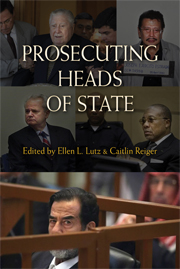Book contents
- Frontmatter
- Contents
- List of Contributors
- About the International Center for Transitional Justice
- Foreword
- Preface
- 1 Introduction
- 2 Prosecutions of Heads of State in Europe
- 3 Prosecutions of Heads of State in Latin America
- 4 The Multiple Prosecutions of Augusto Pinochet
- 5 A Leader Takes Flight: The Indictment of Alberto Fujimori
- 6 Charm and Punishment: How the Philippines' Leading Man Became Its Most Famous Prisoner
- 7 Shifting Legitimacy: The Trials of Frederick Chiluba
- 8 A Justice “Trickle-Down”: Rwanda's First Postgenocide President on Trial
- 9 Justice Squandered? The Trial of Slobodan Milošević
- 10 A Big Man in a Small Cell: Charles Taylor and the Special Court for Sierra Leone
- 11 Political Pedagogy, Baghdad Style: The Dujail Trial of Saddam Hussein
- 12 Conclusion
- APPENDIX: List of Prosecutions of Heads of State or Government since 1990
- Selected Bibliography
- Index
6 - Charm and Punishment: How the Philippines' Leading Man Became Its Most Famous Prisoner
Published online by Cambridge University Press: 06 August 2009
- Frontmatter
- Contents
- List of Contributors
- About the International Center for Transitional Justice
- Foreword
- Preface
- 1 Introduction
- 2 Prosecutions of Heads of State in Europe
- 3 Prosecutions of Heads of State in Latin America
- 4 The Multiple Prosecutions of Augusto Pinochet
- 5 A Leader Takes Flight: The Indictment of Alberto Fujimori
- 6 Charm and Punishment: How the Philippines' Leading Man Became Its Most Famous Prisoner
- 7 Shifting Legitimacy: The Trials of Frederick Chiluba
- 8 A Justice “Trickle-Down”: Rwanda's First Postgenocide President on Trial
- 9 Justice Squandered? The Trial of Slobodan Milošević
- 10 A Big Man in a Small Cell: Charles Taylor and the Special Court for Sierra Leone
- 11 Political Pedagogy, Baghdad Style: The Dujail Trial of Saddam Hussein
- 12 Conclusion
- APPENDIX: List of Prosecutions of Heads of State or Government since 1990
- Selected Bibliography
- Index
Summary
On July 1, 1998, after appearing in almost 150 movies and spending almost thirtyyears in public service, actor and politician Joseph “Erap” Ejercito Estrada was elected president of the Philippines. Once in office, he not only continued living like a movie star but used government funds to enrich himself, his mistresses, and his cronies. Just three years after his landslide victory, Estrada was ousted in a popular uprising. In a country besieged by generations of political corruption, Estrada's crimes and lifestyle proved the perfect lightning rod for the country's first attempt to hold a head of state accountable for crimes committed while in office.
During Estrada's trial, many worried that the Philippine antigraft court, the Sandiganbayan, would be unable to muster sufficient institutional independence to convict Estrada. In addition, they suspected that Estrada's lenient treatment and the frequent trial delays were a response to President Gloria Macapagal Arroyo's political fragility. Yet to the amazement of many, Estrada's trial demonstrated that the Philippine judiciary could deliver justice.
But old habits die hard. After Estrada's conviction, President Arroyo, then looking for a way to divert attention from one of her own corruption scandals, delivered a pardon so swift that the result now feels like a return to corrupt politics as usual.
- Type
- Chapter
- Information
- Prosecuting Heads of State , pp. 111 - 129Publisher: Cambridge University PressPrint publication year: 2009
- 1
- Cited by

